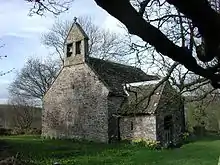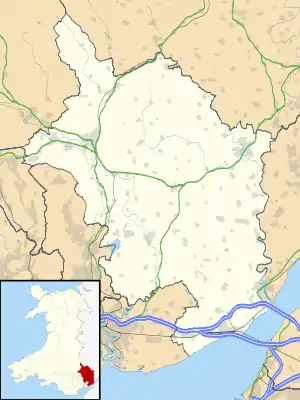Church of the Holy Cross, Kilgwrrwg
The Church of the Holy Cross, Kilgwrrwg, Monmouthshire is an early medieval parish church that once supported a now abandoned village. A Grade II* listed building, the church remains an active parish church.
| Church of the Holy Cross, Kilgwrrwg | |
|---|---|
| Church of the Holy Cross | |
 "a medieval church from a now deserted village" | |
 Church of the Holy Cross, Kilgwrrwg Location in Monmouthshire | |
| 51.6822°N 2.7793°W | |
| Location | Kilgwrrwg, Monmouthshire |
| Country | Wales |
| Denomination | Church in Wales |
| History | |
| Status | Parish church |
| Founded | C13th century |
| Architecture | |
| Functional status | Active |
| Heritage designation | Grade II* |
| Designated | 19 August 1955 |
| Architectural type | Church |
| Style | Early English/Decorated |
| Administration | |
| Parish | Kilgwrrwg |
| Deanery | Netherwent |
| Archdeaconry | Monmouth |
| Diocese | Monmouth |
| Clergy | |
| Vicar(s) | The Reverend M J Gollop |
History
The writer Clive Aslet, who describes the church as "the remotest (.) in Wales",[1] recounts the legend of the founding of the church, on the spot where two yoked heifers rested.[1] The circular churchyard suggests a Celtic, possibly pre-Christian, origin for the site.[1] The present church is early medieval,[2] Cadw suggesting a 13th-century date.[3] The existing features are from the 16th, 17th and 19th centuries.[3] By the early 19th century, the church was described as little more than "a dilapidated sheepfold".[3] A restoration took place in 1820, at the instigation, and mostly at the expense, of a local schoolmaster, James Davies.[3] More extensive rebuilding was undertaken by John Prichard in 1871,[2] and again in 1977-9 (Cadw)[3] or 1989-90 (Newman).[2] At the time of the 20th century reconstruction, the church was named Holy Cross, no earlier dedication being recorded.[3]
Architecture and description
The church is constructed of Old Red Sandstone,[2] the style a mix of Early English and Decorated.[4] It consists of a chancel, nave, porch and bellcote.[3] The interior is simple, the chancel having a plain truss rather than an arch.[2] The church is Grade II* listed, the listing noting it as an "attractive and little altered medieval church from a now deserted village".[3]
The churchyard contains an early cross, which is both a Grade II listed structure and a Scheduled monument.[5]
Notes
- Aslet 2011, p. 480.
- Newman 2000, p. 262.
- "Listed Buildings - Full Report - HeritageBill Cadw Assets - Reports". cadwpublic-api.azurewebsites.net.
- "HOLY CROSS CHURCH, KILGWRRWG - Coflein". www.coflein.gov.uk.
- "Listed Buildings - Full Report - HeritageBill Cadw Assets - Reports". cadwpublic-api.azurewebsites.net.
References
- Aslet, Clive (2011). Villages of Britain: The Five Hundred Villages that Made the Countryside. New York: Bloomsbury Publishing USA. ISBN 9-781608-19672-2.
- Newman, John (2000). Gwent/Monmouthshire. The Buildings of Wales. London: Penguin. ISBN 0-14-071053-1.